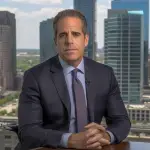In today’s wild political landscape, there’s no shortage of drama, especially when it comes to the inner workings of the federal government. Recently, former White House press secretary Kayleigh McEnany, who now cohosts a popular show, shared her thoughts on the challenges some conservative figures are facing against what she terms the “deep state.” This intriguing discussion revolves around two individuals: Kash Patel and Pete Hegseth, both of whom have proven themselves as strong voices for change in a bureaucracy often resistant to conservative ideas.
The conversation pointed out that Patel and Hegseth are being targeted by those who feel threatened by their forthrightness. These individuals are ready to shake things up and expose the entrenched interests within the federal workforce. Patel, known for his sharp intellect and innovative thinking, has been in the trenches, even sharing air travel on Air Force One. He engages in deep discussions about important policies, contrary to suggestions of nefarious plans involving the media. Instead, what’s stirring the pot is the whispering campaign that tries to paint these outspoken figures in a negative light.
McEnany took a moment to reflect on the historical context of “resistance” within the government, recalling how, just after President Trump took office, a clandestine network of federal employees began plotting against him. This group reportedly gathered in a church to discuss strategies aimed at undermining the Trump administration while creating anonymous channels to leak information. The “resistance” was not just a fad; it was a full-blown operation that showcased the lengths to which some career bureaucrats would go to maintain their power. Such maneuvers are expected to rear their heads again if Trump takes office for a second term, setting a foreboding tone for the challenges ahead.
Adding to this drama is the recent news that 42,000 federal employees have signed contracts allowing them to work from home for the next five years. This new work-from-home deal raises eyebrows because many see it as indicative of entitlement among federal workers who believe they can remain in their comfortable positions regardless of the political tide. The comparison to influential figures like Dr. Anthony Fauci, who has maintained his high-profile role since the Reagan administration, illustrates how some bureaucrats seem to have mastered the art of political survival, remaining intact through numerous administrations despite ideological shifts.
Moreover, the ongoing trend of these long-standing bureaucrats suggests a level of insulation from consequences that many average workers wouldn’t experience. In the eyes of some commentators, figures like FBI Director Christopher Wray have enjoyed cushy tenures akin to being fixtures in Washington. It appears almost as though they’ve made careers out of surviving political storms while remaining untouched by significant accountability.
As the political battleground continues to shift, one thing is clear: the fight against the so-called deep state is heating up. With both Patel and Hegseth equipped to tackle these issues head-on, it remains to be seen how they will navigate the murky waters of the federal landscape. Eager supporters hope that with more leadership like theirs, the tide might finally turn against entrenched careerists who think they can weather any storm. After all, a more transparent and accountable government is something for which many Americans yearn. In a time when stakes feel especially high, focusing on cleaning up Washington couldn’t be more relevant.




